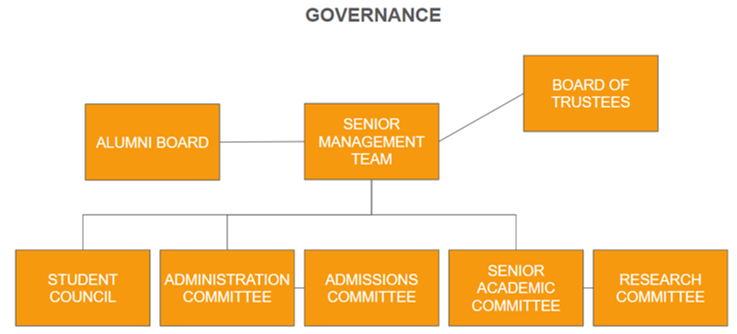The International Institute in Geneva is governed by a foundation board.
The Senior Academic Committee and the Alumni Advisory Council participates in the strategic decisions of the Institution
The Foundation Board
The Foundation Board, also referred to as the Board of Trustees, is the supreme governing body of the IIG Foundation. The mission of IIG is approved by the Swiss Supervisory Authorities for foundations. Should IIG wish to change its mission it would have to obtain approval from the Supervisory Authorities for a change in purpose. The Board members meet once a year and approve the annual audited reports, budget and the activity report of the CEO. All board members are renewed annually through a voting system with the other board members.
Meets 3 times a year and on an ad hoc basis if needed.
The Alumni advisory board
Consisting of former students, experts in their field working in international organisations as well as in the private industry. It animates the Alumni community and chapters and remains an active and participatory line of communication with the institute to provide feedback and recommendations to the Senior Leadership Team regarding IIG programs. The Alumni advisory board is involved as well in the Strategic cycle review and definition.
Meets 3 times a year and on an ad hoc basis if needed.
Senior management team
The President is assisted in his work by the senior management team of IIG which consists of the Academic Dean, the Vice President External Relations, the Head of Administration with the participation of the Quality manager. The Senior management team monitors the strategic objectives set in the strategic planning. It acts as a connection point between the foundation board and the Institution community and is the executive sponsor of the quality assurance strategy.
FInally, the Senior management team ensures progress towards IIG strategic goals, identifies areas for breakthrough improvements and maintains or develops accreditation.
Meets every month and on an ad hoc basis if needed.
Senior Academic committee
The Senior Academic committee (SAC) rolls out the teaching strategy, and ensures the continuous improvement of the IIG curriculum based on regular feedback loops. It consists of the Academic Dean, the registrar and the heads of departments. The SAC ensures the principles of education freedom and integrity. It ensures the oneness and continuity between education and research through its close connections with the Research committee.
Meets every month and on an ad hoc basis if needed.
Students Council
The students council represents the voice of the students in front of the key stakeholders. It organises events and visits and contributes to the IIG welfare philosophy by integrating new students. It consists of two students elected by the student community, and council members representing the different levels and programs of IIG. The Students council co-drives the ethics and sustainability agenda by selecting priority initiatives, implementing them and assessing their
impacts. The Students council is involved in the overall IIG Strategy definition and assessment.
Meets every week and on an ad hoc basis if needed.
Research committee
The Research committee designs, implements and assesses the research strategy by creating the space for research to be a fundamental core element of the institution, encouraging faculty publications, students involvement in research, search for funding and partnerships development. It consists of the Head of research, two Heads of departments and faculty representatives.
Meets every quarter and on an ad hoc basis if needed.
Administration committee
The Administration committee ensures that all core operations are stable and continuously improved to support the IIG mission and vision. It provides services to students, ensures sound financial management and develops the IT infrastructure to support our centred learning approach while developing IIG staff. It consists of the Head of Administration, the Admission directors, and the different student services representatives (library, housing, etc.)
Meets every month and on an ad hoc basis if needed.
Admissions committee
The admissions committee ensures the adherence to the admissions standards. Provides visibility and statistics from applications to admissions. Assesses special cases.
Meets every quarter and on an ad hoc basis if needed.
Organization Chart


